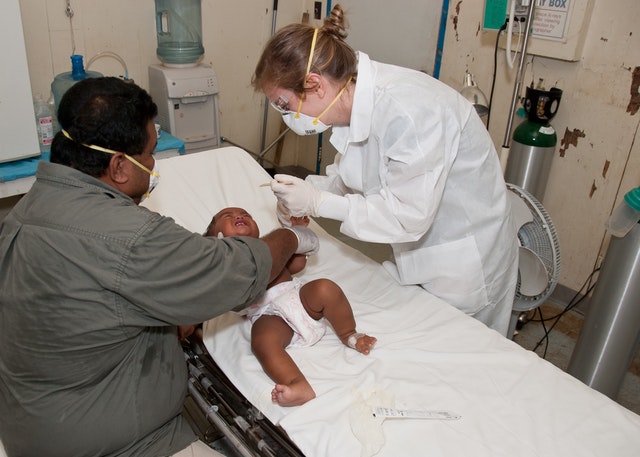Rapidly rising fever, especially in children between six months and three years, can provoke a fever. Then there is a short circuit in the brain. A febrile seizure is similar to a seizure, but it is not. It also does not increase the risk of epilepsy later in life. If your baby has a fever, he or she makes jerky movements. It is possible that your baby will lose consciousness or stop breathing for a while. The face can also turn blue. So this can look pretty scary! However: a febrile seizure is almost always harmless and in most cases will pass again after a few seconds to minutes.
In a febrile seizure, it is important to remain calm. Place your baby on his or her stomach or side with the head down and provide fresh air. Always notify your doctor in case of a febrile seizure . In very rare cases, the convulsion will not go away on its own and the GP must administer a medicine that interrupts the convulsion.
Febrile seizures do not otherwise damage the brain. Children who have ever had a febrile seizure usually get it again in the next feverish period. Febrile seizures are also often ‘in the family’. If you have ever had a febrile seizure yourself, it is more likely that your child will also have one during a feverish period.
When should you see a doctor?
Contact your doctor if:
- Your baby’s body temperature rises to 40 degrees.
- The fever rises quickly.
- The fever lasts longer than three days.
- Your little one has a fever, cries moaning and inconsolable.
- Your little one has a fever and is drowsy, lethargic or unable to wake up well.
- Your little one has a fever and gets red spots.
- Your little one is in a lot of pain when you raise the legs when changing.
- Your baby is getting sicker fast.
- Your baby’s skin color changes.
- Your baby should vomit and / or have diarrhea.
- Your baby will have a fever again after a few fever-free days.
- Your baby has a fever.
- When your little one is short of breath.
- If your little one becomes unconscious.
Is your baby under three months old and does he or she have a fever? Then immediately inform the doctor. Also, contact your doctor if your little one shows symptoms other than the above that you don’t trust.
What research can the doctor do if your baby has a fever?
In most cases, the doctor will first discuss your baby’s situation by telephone. The doctor first asks about the age of your baby, the height and duration of the fever, how your baby reacts and any additional symptoms such as vomiting, diarrhea and urination problems. Your doctor also asks about other symptoms that may indicate an infection or complication.
If you go to the practice with your baby, the doctor may perform tests to determine the cause of the fever. In young children this can often be done through the ears: the doctor then examines the ears with a binocular (otoscope). In this way, the GP can assess whether there is an ear infection.
If the GP does not find a cause for the fever in this way, he or she can expand the examination. The doctor can then listen to the lungs, examine the abdomen and look into the throat. In addition, the doctor examines whether your child has symptoms that indicate a serious infection or complication.




